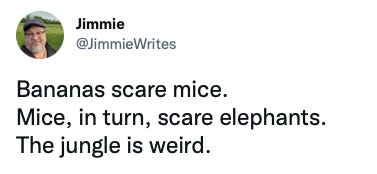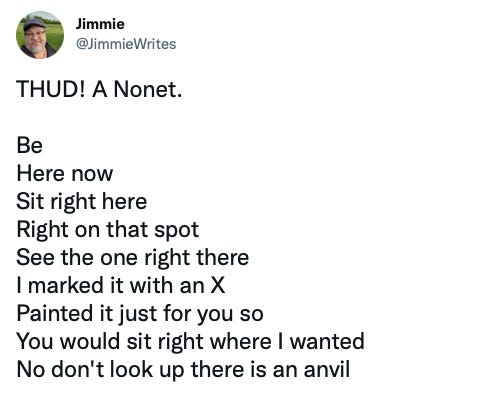Thursday! 2-32: Taking Myself to School
Volume 2, Issue 32
This week, I don’t expect to be the drinking fountain of encouragement I usually am in this newsletter. The week has been a bit rough on me, even though it’s barely half done and I’m feeling a bit beaten up and tired.
”But Jimmie, you magnificent creature who inhabits the Empyrion of newsletter writers,” I can almost hear you say. “Whatever shall you write, if not words of encouragement? That’s pretty much all you do here! What, if we may be so bold, the heck, man!?”
You may, of course, be so bold and not only do I accept your effusive compliments with my usual cool aplomb but I also appreciate them greatly. I’ll tell you what the heck! Right now, I’ll tell you.
Hang on. It’s coming to me.
(I might have spent a bit more creative juice than I intended on that whole Empyrion thing, which is a word you won’t find in just any e-mail newsletter, so…
[Support my art and become a Patron today! Quick, easy, and so very satisfying!])
Aha! I have it! How about learning something new about your art? Anyone up for that this week? I sure am. You probably noticed I didn’t have any new poems to add last week. In truth, I’d written a few things but none of them were particularly suitable for publication. They were experiments, partial poems, snippets of story and dialogue, or little wordplay games. Really, though, they were little bits of homework I gave myself in a new class I’m taking.
This class doesn’t have a name, nor a classroom, nor a set time when the bell rings and I have to be at my desk. At last count, I have two teachers and I’m about to add three more. I get to work at my own pace and any tests I take are of my own devising and — here’s the scary part — the whole world gets to grade them.
This is, of course, my silly way of telling you that I’m teaching myself more about writing. Specifically, I’m teaching myself more about poetry. See, I’ve never taken a class on poetry, not even in high school or college. Everything I know I’ve picked up from reading poems, reading what other poets say about their poetry, and from an excellent Billy Collins Masterclass. I know next to nothing about the forms of poetry nor the basic rules of construction. Some folks might say that I don’t need any of that stuff, that poetry comes from the soul and pours out onto the page however it comes, but that doesn’t work for me. Poetry, like every other type of writing, has rules and conventions. It has to have structure in order for people to make good sense of it without a guide. Structure also imparts a certain type of beauty that can be broken in even more beautiful ways, but without knowledge of basic poetic forms, you don’t know what you’re breaking nor why.
So I’m teaching myself those structure. Right now, my main teachers are Mary Oliver and Stephen Fry1. Soon I’ll add three or four others to that list, thanks to my local library and its excellent interlibrary loan system. If I’m lucky, I’ll pick up a real, live mentor along the way, but I’m not holding my breath. Right now, I have all I can handle learning about rondeaus and terza rima and the differences between a haiku and a senryu2. My tests, when it’s time for them, will involve sending my poems out into the world and seeing how they’re received. If I’ve applied my lessons well, they’ll get read and liked. If I haven’t quite gotten the hang of things, they won’t be. At least that’s the standard I’m going to apply (which, I admit, doesn’t account for luck and probably should since “marketing” is mostly luck and money).
That’s me, though. How about you? Are you ready to dig a bit more deeply into your art? Are you ready to learn more about the traditions and history of what you do? Are you eager to take your place among those who treat art as craft and learn as much as they can about as they go along? Now, I’m not saying you need to go about this with dour mein and plodding feet. Learning about your art can certainly be a chore, as countless high school teachers have demonstrated for decades, but who says it has to be that way? I don’t. I’m pretty sure you don’t want it to be that way. So don’t let it be. Dig into your favorite writer and see what you can learn about how they went about their work. Learn about the three-act structure and how you can hang any sort of story on it you want. Grab a book or a video or a podcast and fill yourself up with stuff you never knew about that thing you love to do.
Then see what you do with it. Who knows what might happen?
What I Wrote Last Week
A Poetry Handbook and Rules for the Dance by Mary Oliver and The Ode Less Travelled by Stephen Fry.
Though they’re built the same, the haiku generally describes nature and does not refer directly to the poet while a senryu speaks about humanity (often in a funny way) and can involve the poet directly.







